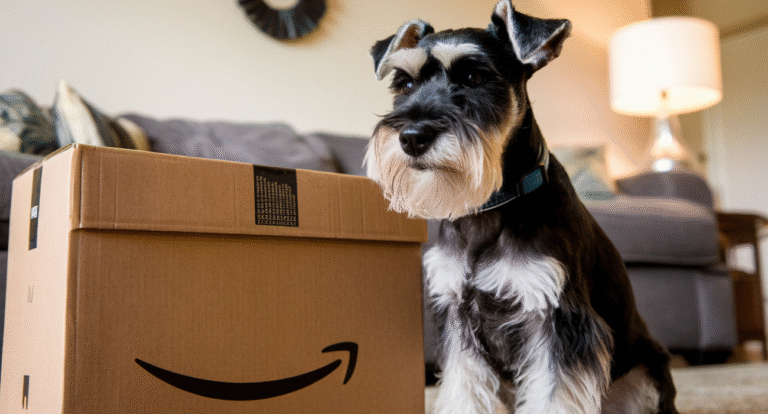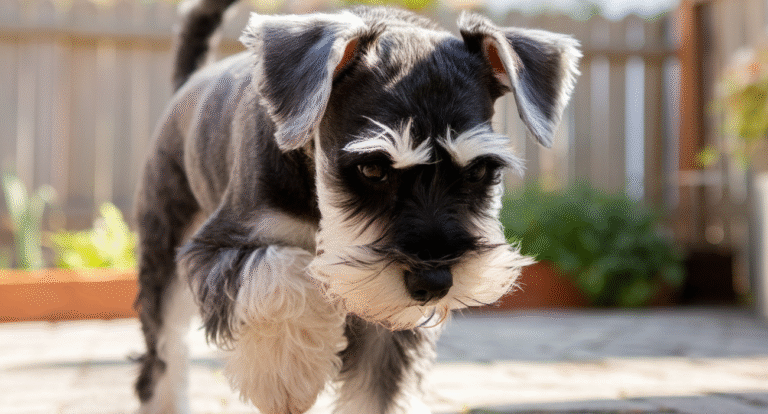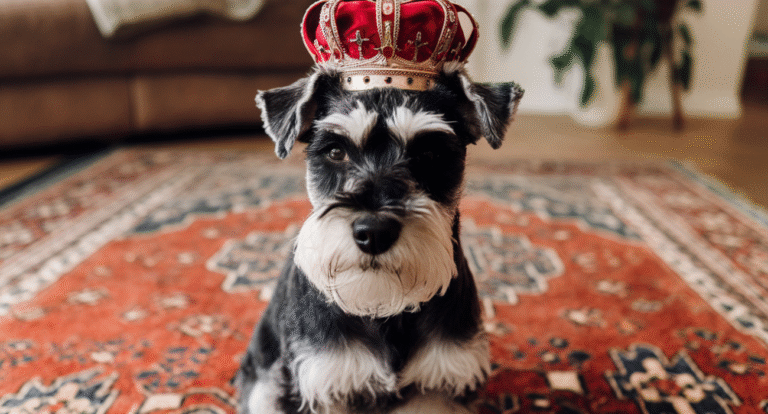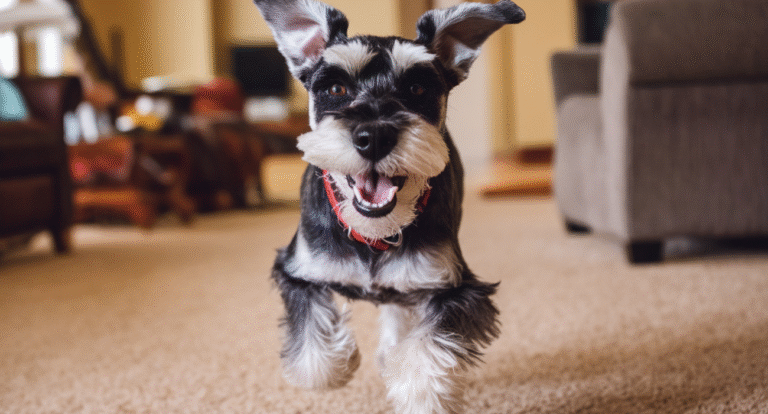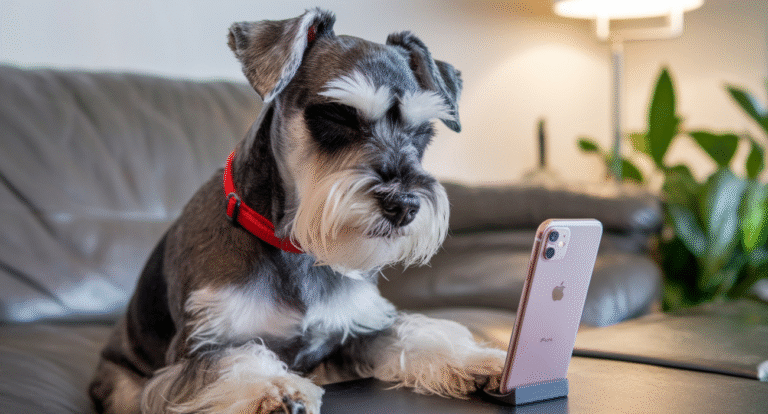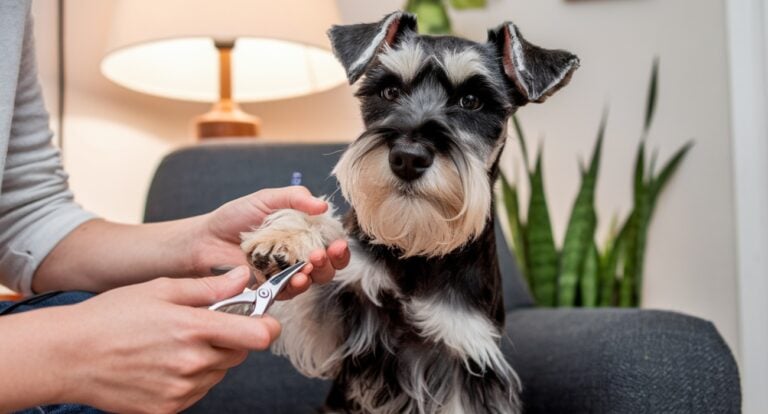It’s not always just excitement! Find out the surprising reasons your Schnauzer might be peeing more than usual.
If you own a Schnauzer, you’ve probably noticed it, your furry friend seems to pee a lot. Sometimes it’s a quick squat every 10 minutes on a walk. Other times, it’s a surprise puddle at home right after they just went outside. Should you worry? Or is it simply a Schnauzer quirk?
The truth is, frequent urination in Schnauzers can be perfectly normal in some cases… but it can also be a sign of something that needs medical attention. Let’s break down the possibilities.
The Schnauzer Bladder Chronicles: Understanding the Basics
Before we dive into the reasons behind your Schnauzer’s frequent bathroom breaks, it’s helpful to understand what’s considered “normal” for these spirited little dogs. Schnauzers, particularly Miniature Schnauzers, have some unique characteristics that make them stand out in the canine world, and their bathroom habits are no exception.
Remember: A Schnauzer’s frequent urination isn’t always a cause for alarm. Sometimes, it’s simply their way of navigating the world, one pee at a time.
These intelligent, energetic dogs were originally bred as ratters and guard dogs, which means they’re naturally alert and territorial. This breeding history plays a significant role in their marking behaviors and overall approach to bathroom etiquette.
1. The “Marking” Mindset: Schnauzer Communication 101
Miniature Schnauzers, especially males, are natural markers who treat every walk like a neighborhood newsletter. Even if their bladder isn’t full, they’ll leave small “messages” for other dogs during walks. This isn’t necessarily a problem, it’s just communication in dog language.
Think of it this way: while you might check your phone for updates, your Schnauzer checks fire hydrants, lamp posts, and bushes for the latest “pee-mail.” Each small squirt carries information about who’s been in the area, their health status, and even their mood. It’s like a canine social media platform, except instead of scrolling through feeds, they’re sniffing through scents.
Tip: Neutering can reduce marking in males, but training and consistent routines help the most. Teaching the “leave it” command and rewarding your Schnauzer for walking past marking opportunities can help redirect this behavior when it becomes excessive.
2. Small Bladder, Big Personality: The Size Factor
Here’s where basic biology comes into play. Compared to large breeds like Great Danes or German Shepherds, Schnauzers have significantly smaller bladders. It’s simple math, less storage space means more frequent emptying. But don’t let their compact size fool you; these dogs often drink a fair amount of water, especially if they’re active (and most Schnauzers are perpetually ready for adventure).
A typical Miniature Schnauzer weighs between 11-20 pounds, while their bladder capacity is proportionally smaller than that of a 70-pound Golden Retriever. This means what might be a two-hour stretch between potty breaks for a larger dog could be just 45 minutes to an hour for your Schnauzer.
3. Excitement & Submissive Peeing: The Emotional Factor
Schnauzers are emotional creatures with big personalities packed into small bodies. Puppies and some adult Schnauzers may dribble when they’re excited, nervous, or greeting someone. This is more about emotion than actual bladder control, and it’s surprisingly common in this breed.
Picture this scenario: you come home from work, and your Schnauzer is so thrilled to see you that they literally can’t contain themselves. The excitement overrides their bladder control, resulting in a small (or not so small) puddle of joy. While endearing in its own way, it can be frustrating for owners.
Tip: Keep greetings calm and avoid towering over your dog when you come home, let them settle before giving attention. Try crouching down to their level and speaking in gentle, calm tones rather than the high-pitched “baby talk” that often triggers excitement urination.
4. Too Much of a Good Thing: Water Intake and Activity Levels
If your Schnauzer is guzzling water after an energetic play session or on particularly hot days, extra peeing is completely expected. These dogs are often quite active and may work up quite a thirst during their daily adventures. However, there’s a difference between normal post-activity drinking and excessive, constant thirst.
Monitor your dog’s water intake patterns. A healthy adult Schnauzer typically drinks about an ounce of water per pound of body weight daily. So a 15-pound Miniature Schnauzer should drink roughly 15 ounces of water per day under normal circumstances.
Key insight: Normal increased urination follows increased activity or water intake. Abnormal urination happens without these triggers and may indicate underlying health issues.
5. Medical Causes: When Frequent Urination Signals Trouble
While many cases of frequent urination in Schnauzers are behavioral or breed-related, it’s crucial to recognize when something more serious might be at play. Frequent urination can signal various health issues, especially if it starts suddenly, increases dramatically, or comes with other symptoms like lethargy, weight changes, or accidents indoors.
| Condition | Key Symptoms | Schnauzer-Specific Notes |
|---|---|---|
| Urinary Tract Infections (UTIs) | Straining, whining, cloudy urine, frequent small amounts | Female Schnauzers more prone; often recurring |
| Diabetes Mellitus | Excessive thirst, increased appetite, weight loss | Miniature Schnauzers have higher genetic risk |
| Kidney Disease | Changes in urination, decreased appetite, vomiting | Can develop gradually; regular bloodwork important |
| Cushing’s Disease | Pot-bellied appearance, panting, skin issues | More common in middle-aged to older Schnauzers |
| Bladder Stones | Blood in urine, straining, discomfort | Miniature Schnauzers genetically predisposed |
Bladder stones deserve special attention in Schnauzers. These dogs have a genetic predisposition to developing calcium oxalate stones, which can cause significant discomfort and urinary issues. The stones can range from tiny crystals to larger formations that may require surgical removal.
6. Red Flags: When to Call the Vet
Your Schnauzer can’t tell you when something’s wrong, so it’s up to you to recognize the warning signs. Schedule a veterinary appointment if you notice:
- A sudden change in urination frequency (much more or much less than usual)
- Blood in urine (may appear pink, red, or dark)
- Straining or signs of discomfort while urinating
- Excessive thirst that seems unrelated to activity or temperature
- Indoor accidents in a previously well-house-trained dog
- Urinating in unusual places or positions
- Signs of pain such as whimpering, restlessness, or reluctance to move
Trust your instincts: You know your Schnauzer better than anyone. If something seems “off” about their bathroom habits, it’s always better to err on the side of caution and consult your veterinarian.
7. Managing Frequent Urination: Practical Solutions
If your veterinarian has given your Schnauzer a clean bill of health but they’re still a frequent pee-er, don’t despair. There are several management strategies that can help both you and your furry friend:
Create a Consistent Schedule:
Dogs thrive on routine, and Schnauzers are no exception. Establish regular potty breaks throughout the day, first thing in the morning, after meals, before and after naps, and right before bed. Consistency helps your dog’s body develop a predictable rhythm.
Anticipate Excitement Triggers:
If you know your Schnauzer gets overly excited about visitors, walks, or playtime, offer a pre-emptive potty break. This simple step can prevent many indoor accidents.
Monitor Treat and Food Intake:
Salty treats can increase thirst, leading to more frequent urination. While it’s fine to give your Schnauzer occasional treats, avoid overloading them with high-sodium options.
Consider Indoor Options:
For owners who work long hours or live in apartments, indoor potty solutions like pee pads, artificial grass patches, or even a designated indoor “bathroom” area can be lifesavers.
Environmental Modifications:
If your Schnauzer marks indoors, thoroughly clean any accident spots with enzymatic cleaners to remove lingering odors that might encourage repeat performances.
The Schnauzer Personality Factor
It’s worth remembering that Schnauzers aren’t just any dog, they’re Schnauzers, with all the personality quirks that come with the territory. These dogs are known for being alert, intelligent, and sometimes a bit stubborn. Their bathroom habits often reflect these traits.
Some Schnauzers seem to view frequent urination as part of their job description, especially if they consider themselves the household’s security detail. Others might be so focused on interesting smells or activities that they forget to empty their bladder until it’s absolutely necessary, leading to urgent, frequent trips outside.
Living Harmoniously with Your Frequent Pee-er
The key to successfully managing a Schnauzer’s frequent urination lies in understanding the root cause and responding appropriately. Whether it’s medical, behavioral, or simply a breed characteristic, there’s almost always a solution that works for both dog and owner.
Remember that patience is essential. If your Schnauzer’s frequent urination is behavioral, changes won’t happen overnight. Consistent training, positive reinforcement, and understanding their individual needs will yield the best long-term results.
Work With Your Schnauzers Natural Tendencies
Some Schnauzers are just enthusiastic pee-ers, it’s part bladder size, part personality, and sometimes part medical necessity. The combination of their small size, big personalities, territorial instincts, and genetic predispositions creates the perfect storm for frequent bathroom breaks.
But here’s the thing: once you understand why your Schnauzer pees so much, you can work with their natural tendencies rather than against them. Whether it means adjusting your walking schedule, modifying their environment, or simply accepting that your dog will never be a “one pee per walk” kind of pup, there’s usually a path forward.
If your dog’s urination patterns change suddenly or you spot other concerning symptoms, a vet check is always the safest next step. Many conditions that cause frequent urination are highly treatable when caught early.
With the right balance of awareness, patience, and care, you can keep your Schnauzer’s bathroom habits healthy and your floors accident-free. After all, a well-understood Schnauzer is a happy Schnauzer, even if they do pee a little more than you’d prefer.

